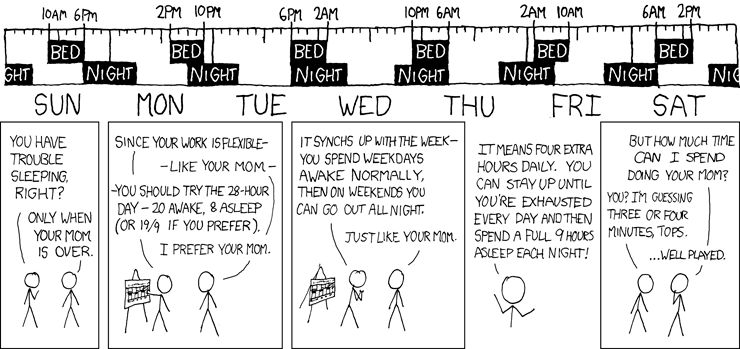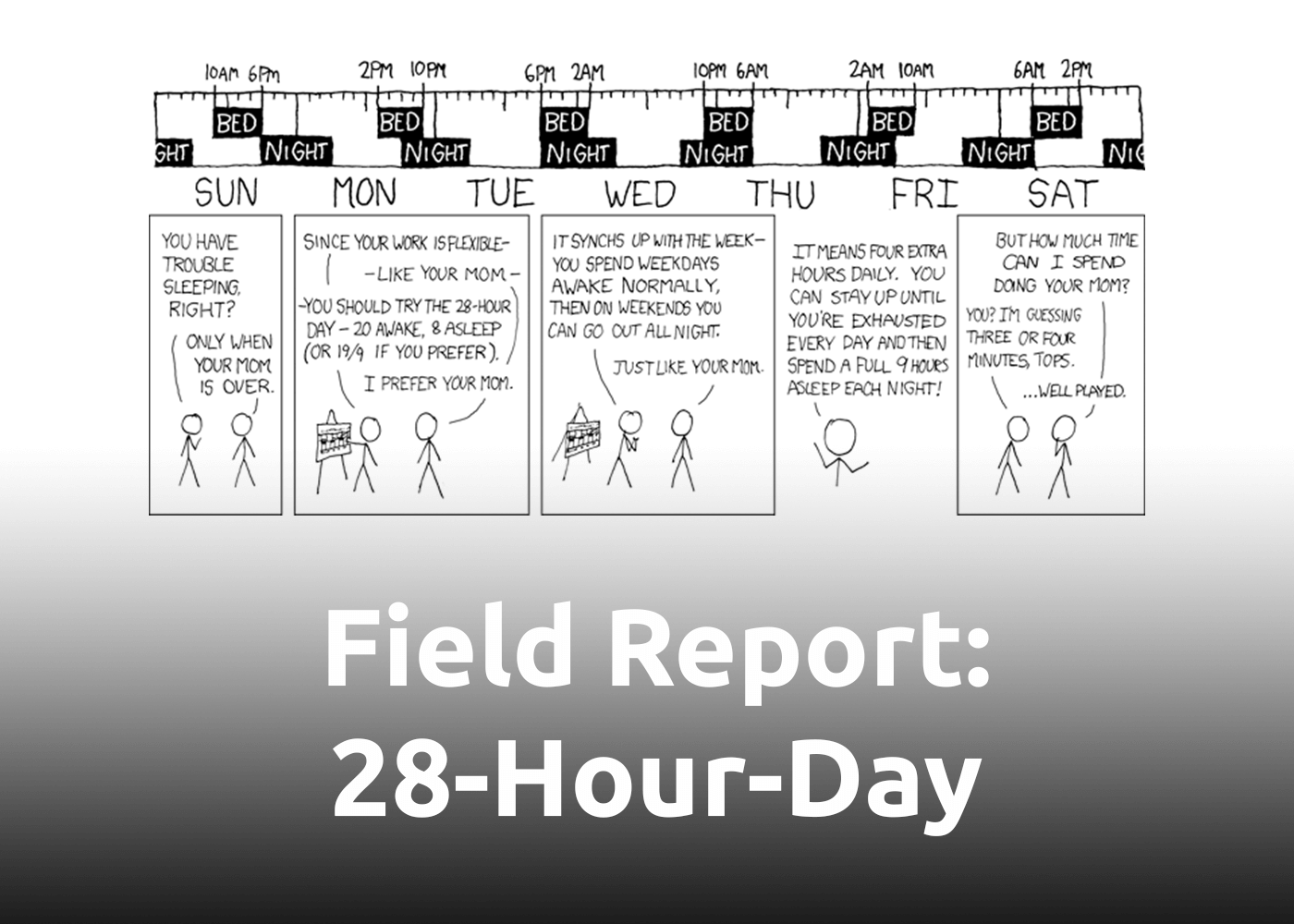Everything started with this xkcd comic, where one person explains the benefits of the 28-hour day sleep schedule and the other one only makes your mom-jokes:

More background information can be found here.
The Sleep Pattern
As you can see in the comic, the schedule is based on 20 hours awake, followed by 8 hours of sleep, while ignoring the regular day and night phase. This turns a 24-hour day into a 28-hour day and a classical 7-day week into a 6-day one.
With this model, the total awake time is 120 hours each week compared to 112 hours in a classical week, given an 8 hours sleep phase every "normal" night. Sounds interesting, right?
The Field Test
After reading about other sleep cycles and experiences in the 28-hour day from other bloggers and studies, I decided to test it for one week on my own. In the following, I talk about my experiences during the days. If this isn't interesting for you, skip it and read my final thoughts and tips at the end of this article.
Cycle 1
Sleep: 10 pm – 6 am (22:00 – 06:00)
Awake: 6 am – 2 am (06:00 – 02:00)
My first night wasn't that good. I didn't sleep the full eight hours because I normally go to bed later and got some problems when falling asleep. The day phase was pretty normal.
Cycle 2
Sleep: 2 am – 10 am (02:00 – 10:00)
Awake: 10 am – 6 am (10:00 – 06:00)
A really great night! I had no problems falling asleep or getting up at 10 am. The day was more or less normal, reminiscent of long party nights at the weekends. Here I noticed that 20 hours is a long time and it was a little bit tricky to stay awake because I felt tired around one hour before going to bed.
Cycle 3
Sleep: 6 am – 2 pm (06:00 – 14:00)
Awake: 2 pm – 10 am (14:00 – 10:00)
This night wasn't that good. My sleep was interrupted a few times because the rest of the world was awake and active in the morning hours. The day was good except for a hard time window around 4 – 6 am. My body felt tired and wanted to sleep, so I decided to go outside and get my weekly groceries in the supermarket that opens at 6 am (Sidenote: At this time, only some workers were rushing through the supermarket aisles to get some food for the day. I was the only one with time and a shopping cart full of things).
Cycle 4
Sleep: 10 am – 6 pm (10:00 – 18:00)
Awake: 6 pm – 2 pm (18:00 – 14:00)
Okay, things and times were getting crazy! Based on the experiences from my last night, I thought this one would be horrible because of the sounds and interruptions from the outside world of my bedroom, but it wasn't! The night was really great and the day phase, too. I was even awake 1 hour before the alarm clock (I think this is based on the long 8 hours sleep phase. I normally sleep 6-7 hours instead of 8). At this point, I had still felt good and active. The only curious thing was a strange feeling which is difficult to describe that goes through the body the entire day. Maybe this was related to this crazy sleep schedule experience!?
Cycle 5
Sleep: 2 pm – 10 pm (14:00 – 22:00)
Awake: 10 pm – 6 pm (22:00 – 18:00)
The experiment was nearing the end. Nothing special to say. A night of good sleep and a great awake phase.
Cycle 6
Sleep: 6 pm – 2 am (18:00 – 02:00)
Awake: 2 am – 10 pm (02:00 – 22:00)
The last night of the experiment was the first night I was woken up by the alarm clock. In the other cases, I was awake slightly before as mentioned. The last day felt rather normal because the awake time overlapped very much with the one from the other people. For the sake of completeness, I went to bed at 10 pm without setting the alarm clock.
Conclusion
I did it! Do I regret it? No. Would I do it again? Probably, yes!
It was a really funny experience to go with the 28-hour day to sum it up. The advantages are a boost of time and productivity because the day-phases are longer and it allows to work at night without getting interrupted or feeling tired. Besides this, it is possible to plan activities for off-peak hours like going to the supermarket at the earliest possible time, calling a 24/7 available support hotline at 4 am to get rid of long queues or making a walk / run at a beautiful early sunrise. Also, the "I made it!"-feeling at the end is really great!
One disadvantage is the strict timetable because it isn't robust against changes. It isn't possible to spontaneously change the length of a day- or night phase because it will mess up your entire schedule. Further, it is hard to interact with the environment. Just think of making a haircut appointment when you sleep during day time.
In my case, the worst / hardest night was the one from 10 pm – 6 am (22:00 – 06:00) because this start cycle doesn't fit perfectly to my normal sleep hours. The worst / hardest awake time was the one from 2 pm – 10 am (14:00 – 10:00). As mentioned earlier, I felt tired the last hours before going to bed, which does not support this period.
Would I suggest you try it on your own? If you are interested in it and have time and space to try it, definitely yes!
Tips
Here you will find some tips if you want to try it:
Start with the most comfortable cycle!
It is important to start with a good sleep in the first cycle. So set the first sleep phase as near as possible to your normal sleep time.
Shift your mealtime to the correct hours for your day!
When it comes to meals and food, try to eat breakfast after you wake up, dinner many hours before you go to bed and lunch somewhere in between. It feels strange when you eat dinner at 8 am when other people in your environment start the day with breakfast, but it will be the best.
Stay and plan with your cycle!
Remember that being on time is one of the key components of this sleep model. Choose a week where it fits your plans. Make calendar entries for your sleep times to keep an eye on them and really be on time when going to bed or standing up. Here is a tool that helps planning your week with existing appointments.
Hope my experiences can help. If you still have questions or want to talk about your own experiences, I would be very happy if you can share them in the comment section below. Remember that I am not an expert on this topic. If you want to try it, make it at your own risk! If you, your body or mind feel bad, stop it to prevent damages.
References
- Comic "28-Hour Day" by xkcd, licensed under CC BY-NC 2.5


